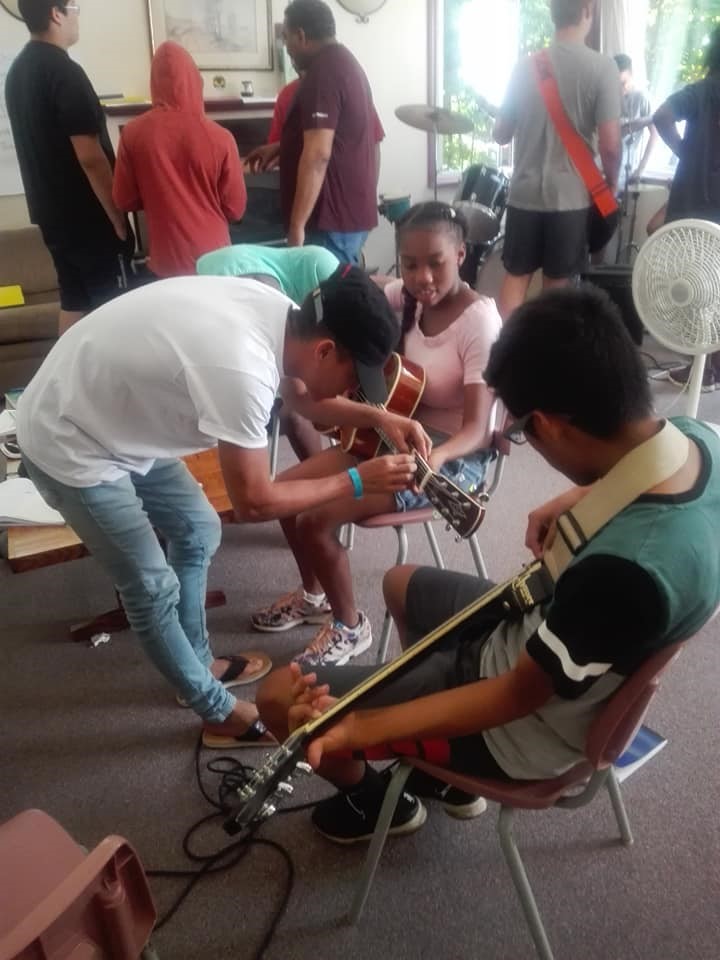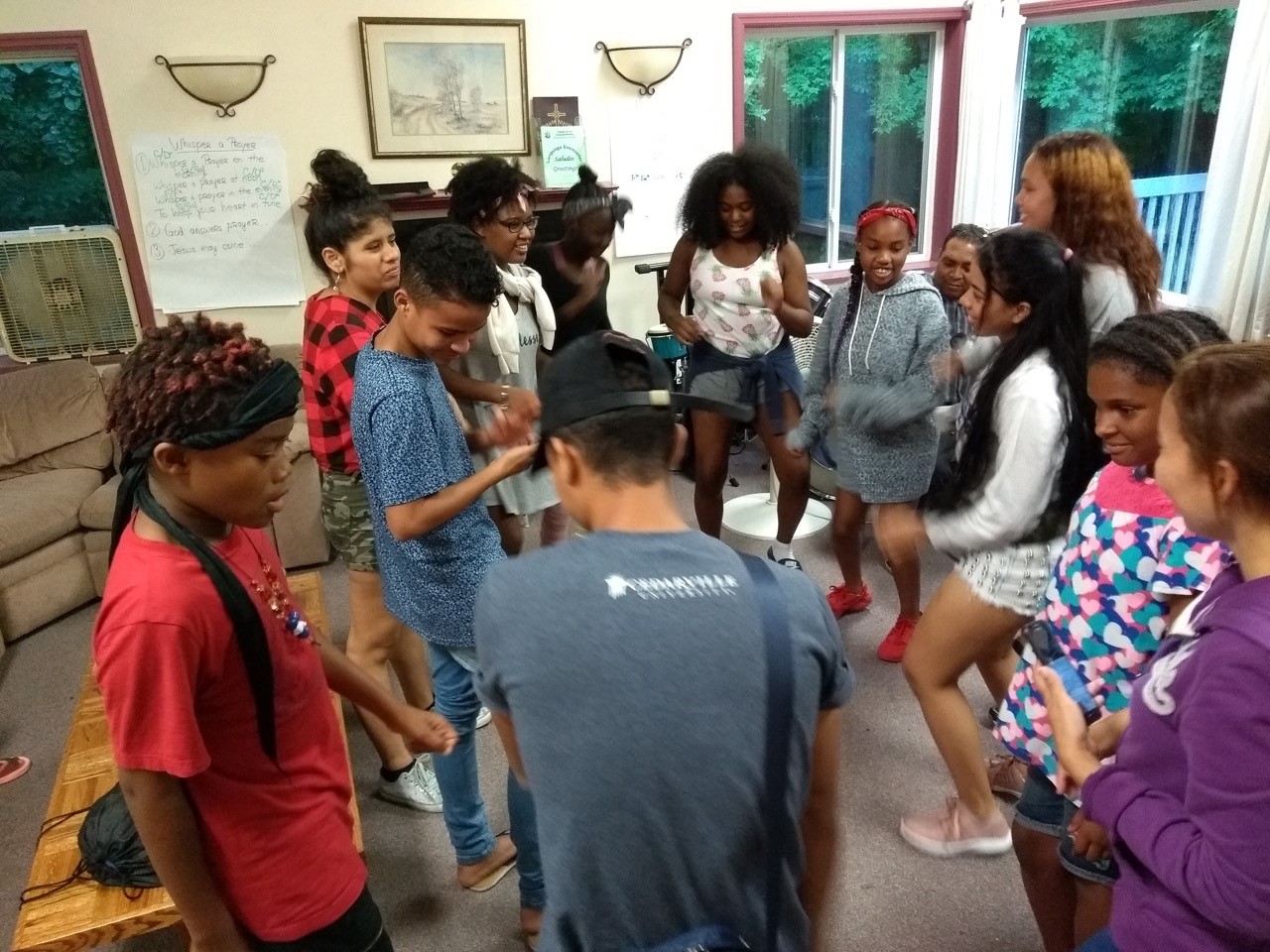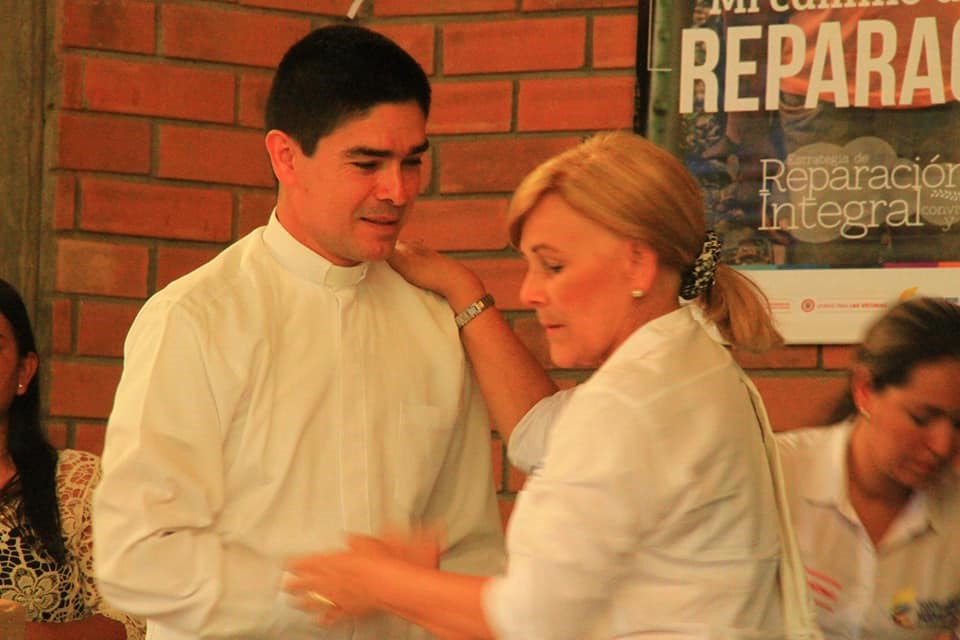A Letter from Sarah Henken, serving as Peace Initiative Promoter and Young Adult Volunteer Site Coordinator in Colombia
August 2018
Write to Sarah Henken
Individuals: Give online to E200475 for Sarah Henken’s sending and support
Congregations: Give to D507536 for Sarah Henken’s sending and support
Churches are asked to send donations through your congregation’s normal receiving site (this is usually your presbytery).
It was dark; our only illumination came from the stars and the faint light of electric candles. Frogs and crickets serenaded us, and it struck me as a beautiful and holy space. The labyrinth was in a small clearing, surrounded by trees, under the open sky, so I stopped and looked up at the stars every so often as I walked. It was the final night of camp at Kirkmont Center, and we were concluding our vespers service by walking the labyrinth. As I headed out of the labyrinth, I came across one young man who said, “Which way is out?” so I said he could follow me. As we walked along the path, I could almost hear him wondering what the point of it all was, and if we were ever going to get out of the labyrinth!
Honestly, if we take walking the labyrinth as a metaphor for life as a disciple of Jesus, I can relate to his confusion. There are days when I myself wonder where in the world the path is taking me, whether I’m actually getting anywhere. But when we came out of the labyrinth (and I heard a quiet, “Finally!” waft over my shoulder), I saw how moved other young people were. Some were clustered together in prayer, and as we walked back to our cabins I heard several comments about how much the experience that night and during the week had meant to them.
We had led a special bilingual camp focused on music and peacemaking for young people from Dayton, Ohio, and from Cartagena, Colombia. The week had been challenging for all of us, getting to know people from different cultures, practicing new languages and new instruments, and getting what sleep we could — much closer to nature than any of us were used to! But by the end of that final night, there was no doubt in my mind that it was all worthwhile.
We talked a lot about peace at camp, including the problems the young people see in their communities in Colombia and in the United States. While some issues they named are particular, many — immigration, poverty, drugs, political tensions — are concerns for youth from both countries. We wondered about what it means for us to consider ourselves peacemakers, whatever our age or location may be. One way we reflected on this was in reading the story of the “Prodigal Son.” We acted it out and paused to ask questions, discuss all the details, and consider with which characters we identified most. In case you don’t recall the story, it goes something like this:
A wealthy man, two sons. Younger one requests an advance on his inheritance, squanders money, decides to ask father for work as a hired hand. Meanwhile, father hopes his son will come home. So father sees son, runs and scoops him up in a huge bear hug. Son, stuck in his own expectations, recites the speech he’s prepared: “Father, I have sinned against heaven and before you; I am no longer worthy to be called your son.” Father wastes no words debunking son’s notion of worthiness, just orders a celebratory feast and turns up his favorite dance music. Dutiful older brother comes home from the fields, sees welcome-home party for deadbeat younger brother, stays outside nursing resentment. Father begs him to come in and celebrate, wants both beloved sons together. And then …
Jesus leaves the story unresolved, so we wrote our own endings.
According to one group, love prevails and older brother makes peace with undeserving kid brother. Another group imagines older brother sneaking in at night to murder his brother, has change of heart at the last possible second when younger brother wakes up and apologizes for the hurt he’s caused. Still another group insists that older brother turns his back on father and leaves town instead of welcoming his embarrassment of a brother.
Which story do you think is most likely? Which story would Jesus hope for us to embody?
In Colombia today, as former FARC guerrilla combatants seek to make restitution to Colombia’s victims and forge a new path without weapons, many refuse to believe that things can really change. The FARC’s mistakes are unforgivable, they say. Nonetheless, those who believe in the power of reconciliation carry on.
My friend and colleague the Rev. Diego Higuita spoke in a public ceremony of reconciliation and restitution on July 11 in his hometown of Dabeiba. Dabeiba is located in a beautiful spot above the Río Sucio, along the single highway that winds through the mountains from Medellín to the fertile Urabá valley, but it has been hard hit by the conflict in Colombia, and still bears the scars. At the ceremony, a former commander of the FARC guerrilla group asked forgiveness from Yolanda Pinto, the director of Colombia’s victim reparations program and a victim herself, whose husband was killed by the FARC. Nine hundred more victims of the conflict attended the ceremony and received long-awaited compensation through the government office.
When I received this news, I was elated, energized, encouraged. What I’d scarcely believed possible was actually happening! But the very same night I also received word of new panfletos being circulated, the all-too-familiar method of rightwing militias writing out and publicly distributing threats against people whom they identify as enemies of the nation, but whom I call the brave ones who dare to work for a new future with reconciliation and peace. It was hardly necessary to put the threats in black and white, because the message was already clear. Assassinations of human rights workers and community leaders who seek justice and land rights have been increasing since the peace accords were signed in 2016, and they doubled pace to one every day or two following the election of Colombia’s new president Iván Duque in June.
The panfletos name individuals and organizations, and this recent wave includes a few close allies of the Presbyterian Church of Colombia who are now at heightened risk because of people who fashion the concepts of law and justice according to their own interests. My friends are frightened about this, and angry. But what else can they do but continue following the path of peace, working for reconciliation? It’s a bit like the practice of walking the labyrinth — the path may seem to carry us where we don’t want to go, but if we continue to follow, it will take us where we need to be. And we can be sure of one thing: God will be there, no matter what else comes.
It is a privilege to serve here in this place, at this time, and to support the Presbyterian Church of Colombia in its work for peace. The question at the end of the Prodigal Son remains unanswered: Will the entire family embrace the opportunity for reconciliation, recognizing their identity as one people, or will some reject and undermine it? And so, a key part of our task is the work of peace education and of accompaniment, preparing the soil of our hearts for the seeds that will one day bear the fruit of reconciliation.
Please continue to pray for Colombia, for those whose lives are on the line, and for those who would rather threaten others than accept the possibility of reconciling with brothers and sisters of a different ideological perspective. I am deeply grateful for your prayers and for those who have made financial contributions to support my work here. Your gifts, large and small, help ensure I can continue to be part of this ministry as long as it is needed.
God says through the prophet Isaiah, “I am about to do a new thing; now it springs forth, do you not perceive it?” May we have faith to perceive and help nurture the new things God is doing.
In hope and faith,
Sarah
![]() You may freely reuse and distribute this article in its entirety for non-commercial purposes in any medium. Please include author attribution, photography credits, and a link to the original article. This work is licensed under a Creative Commons Attribution-NonCommercial-NoDeratives 4.0 International License.
You may freely reuse and distribute this article in its entirety for non-commercial purposes in any medium. Please include author attribution, photography credits, and a link to the original article. This work is licensed under a Creative Commons Attribution-NonCommercial-NoDeratives 4.0 International License.


